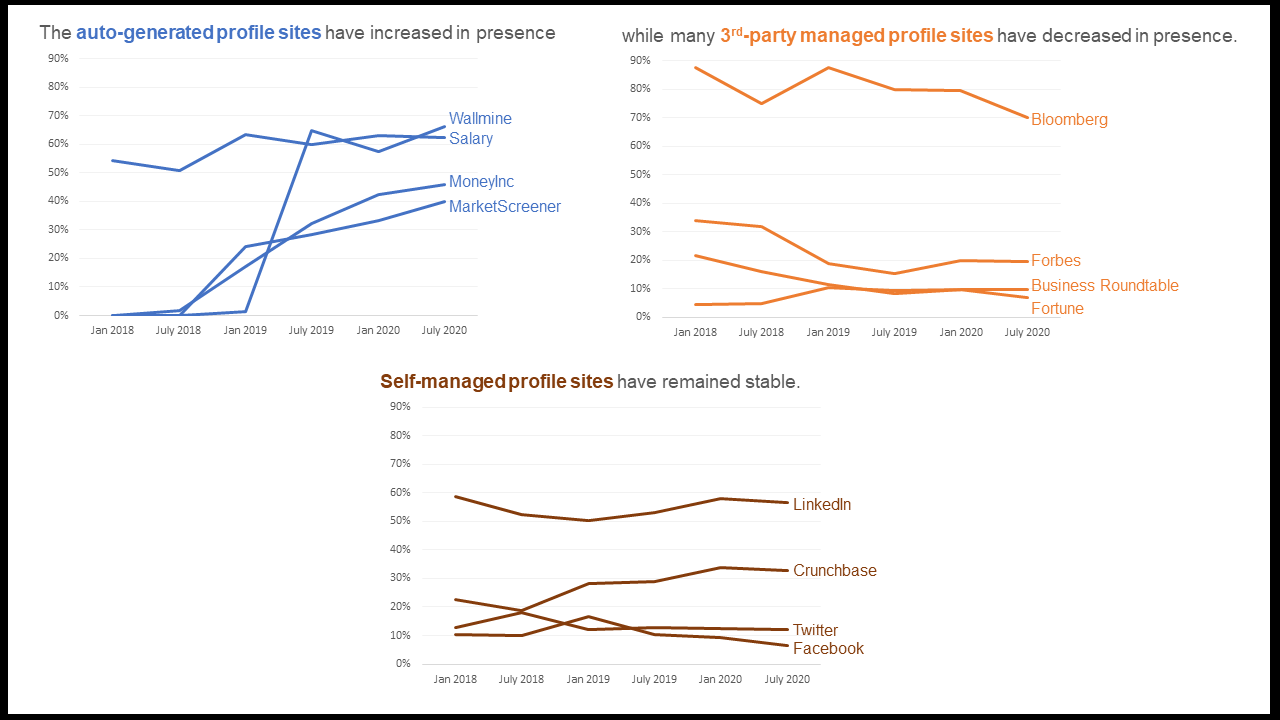Just the Facts: The rise of auto-generated profile sites, and what that means about the direction of search
People like to do quick, basic research before engaging in business. As the go-to place for that research, Google’s page 1 has become a kind of dossier about people and brands. This is why the Knowledge Panel (the summary info that typically appears on the top right part of the Google search results page) has become the gold standard for quick stats of notable individuals. It’s also why the People Also Ask box, with its quick and easy question and answer format, has been pushed front and center by Google. It’s as if searchers have repeatedly said to Google, “Just the facts, Ma’am,” and Google has complied.
Typically, results for top CEOs will include their Wikipedia page, their company’s website, top news stories, and various types of profile sites, which provide a quick snapshot of facts for users.
(Note: Perhaps the most interesting data point for many searchers is CEO salary: we found this in a previous study we did on the People Also Ask box. 22% of all questions appearing for Fortune 100 CEOs relate to their salaries.)
We recently surveyed Google results for Fortune 500 CEOs over three consecutive years (on the same dates) to assess the changing prominence of different kinds of profile sites in their top results.
We found that self-managed profile sites – LinkedIn, Twitter, and Facebook (in addition to Crunchbase, which can be self-managed) – have remained more or less stable in terms of their prevalence on page one for CEOs.
At the same time, third-party profile sites, like Bloomberg, Forbes, Fortune, and Business Roundtable have slightly decreased in page one presence for CEOs over the years. Bloomberg, for example, appeared in page 1 search results for nearly 90% of these CEOs through early 2019; today that’s down to 70%.
The sites that have risen in prominence are auto-generated profile sites, which pull relevant information from multiple websites and databases to create a one-page dossier on executives. These sites, namely Wallmine, Salary, MoneyInc, and MarketScreener, have significantly risen in prominence over the years. Wallmine in particular saw a meteoric rise in 2019 – from appearing for just 1% of CEOs to 65% of them within that same year.
What is interesting about this trend toward automatically created “scraper” sites is that they don’t seem to add a whole lot of value. What are they doing that Google cannot do by itself? Google’s algorithm already tends to prioritize pages and sites that help it answer popular questions and meet the common need for quick facts. Google does this by crawling much of the internet and then displaying the best pages and data points.
When companies do the same type of summarizing, this can be useful to visitors…but only for a time.
Some years ago we saw the same dynamic play out with Answers.com. In order to answer questions people often searched online, that site scraped various authoritative sources and created answer pages – which ranked prominently for tens of thousands of terms. Eventually, though, Google applied a more sophisticated duplicate content filter, demoted Answers.com, found other sites that added more original value, and added its own “dossier” features as discussed above. Answers.com simply wasn’t adding enough value to last long term.
So while right now there are several automatically generated profile websites appearing for many prominent individuals, some of which can actually be managed to some extent (MarketScreener offers an option for a paid profile, for example), we predict that these sites will not retain their prominence long- term.
In our estimation, for a site to remain relevant and prominent in Google search, it needs to add unique value, providing information or an experience that other sites do not…and that Google can’t manage on its own with its own knowledge graph data.
Ideally, sites that want to go the distance should be filling a gap – providing some deeper answers to the popular questions people have, adding images or videos where those are missing to flesh out someone’s persona, or providing information in a language that is not covered.
Google is a reflection of what people want to see, and people seem to want to see a quick and comprehensive picture. Staying valuable will require a heavier lift for content writers and researchers. The robots – the automated content aggregators – will need to find some other, more helpful, work to do.
About the author:
Miriam Hirschman., Research Manager at Five Blocks, is driven by an endless supply of curiosity and a deep background in data analysis as she digs for the interesting stories behind the numbers. Because we believe in data and tools but believe in people even more, she reviews massive volumes of search results, seeking patterns and finding order in the often chaotic world of web search.

